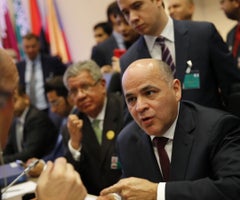MI SELECCIÓN DE NOTICIAS
Noticias personalizadas, de acuerdo a sus temas de interés

OPEC will continue to operate normally despite U.S. sanctions placed on the oil cartel’s Venezuelan president, officials from the group said on Monday.
The Trump administration has accused Manuel Quevedo, president of state-owned oil company Petróleos de Venezuela SA, of being part of a state-run corruption machine that has siphoned billions of dollars from national coffers for personal gain, enriched those close to the government, and helped maintain political control as the country’s economy implodes.
Mr. Quevedo, who also serves as Venezuela’s oil minister and a member of President Nicolás Maduro’s cabinet, recently began a one-year term as head of the Organization of the Petroleum Exporting Countries, which uses a system of rotation.
The Trump administration stopped recognizing Mr. Maduro as the country’s head of state in January, instead backing opposition leader Juan Guaido and taking steps to empower him. The U.S. Treasury Department on Friday deemed Mr. Quevedo’s position in Venezuela as “illegitimate.”
As part of his OPEC duties, Mr. Quevedo is set to travel to Azerbaijan next month for a gathering between the group’s members and Russia, and then to a Vienna summit to decide on crude production in April.
Several OPEC officials, including three from the Persian Gulf, speaking not for attribution, said cartel operations wouldn’t be affected by the sanctions on Mr. Quevedo.
The officials, however, said that OPEC hasn’t determined how to resolve Venezuela’s crisis of rival claims to leadership. The cartel now recognizes Mr. Maduro. But OPEC officials say the group would switch allegiance to Mr. Guaido if the United Nations did so.
The sanctions on Mr. Quevedo “shouldn’t be a problem” for OPEC, said Robin Mills, chief executive of Dubai-based consulting firm Qamar Energy “He is not there to discuss business.”
The U.S. sanctions freeze any of Mr. Quevedo’s U.S. assets and ban American citizens from conducting business with him.
The PdVSA chief responded in a tweet on Saturday that he was unfairly being targeted for his role in protecting the company’s assets in the U.S. from confiscation and reacting to what he called a “coup” by the U.S. and Mr. Guaido.
This isn’t the first time OPEC has had to navigate sanctions on one of its members. Iran is operating under U.S. sanctions that began in October and that have reduced the country’s oil sales. In 2011, Rostam Ghasemi, a commander of Iran’s Islamic Revolutionary Guard Corps who was sanctioned the year before by the European Union, was appointed Iran’s oil minister when Tehran held OPEC’s rotating presidency.
While the restrictions included a business travel ban to the EU, Mr. Ghasemi was allowed to travel to Vienna, where OPEC is based, because the he was deemed to be working for a nonprofit international organization. Mr. Ghasemi even held a bilateral meeting with then-Saudi oil minister Ali al-Naimi, enabling a 2011 production cap.
That year, the cartel recognized Libyan strongman Moammar Gadhafi, who was under sanctions by the U.S. and the EU amid a civil war, as the legitimate leader until the United Nations recognized a rival body.
By Benoit Faucon and Summer Said
Jorge Glas fue arrestado este mes durante una redada policial en la embajada de México en Quito, donde vivía desde diciembre
Musk añadió US$18.500 millones a su fortuna solo el lunes, la decimotercera mayor ganancia diaria impulsada por el mercado
En la Universidad de Washington en St. Louis, la policía arrestó a cerca de 200 personas que protestan en contra del antisemitismo